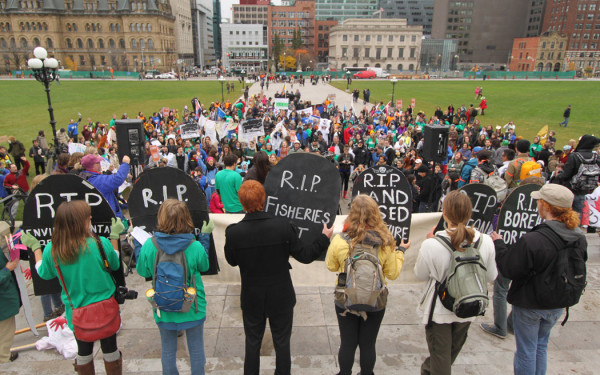Concordia’s Greenhouse in Need of Some Green
Sustainability Concordia’s Project Seeks Fee Levy in Upcoming Elections
Perched on the 13th floor of Concordia’s Henry F. Hall Building is a sanctuary above the city, a safe haven of plants and quietude that features a vista that’s perfect for studying or contemplating the city. It’s also a sanctuary that’s asking students for some money.
The Concordia greenhouse, which started as a space for the Biology Department, has morphed into a hub of innovative agriculture projects, education and research.
The transformation began in 2005, when plans to tear down the structure were thwarted by students and campus organization Sustainable Concordia.
Since then, the Greenhouse Project has existed as a working group under Sustainable Concordia—and working within their budget constraints.
Now, the greenhouse is looking to become an independent fee levy group with a referendum question on the issue to be included in the upcoming elections in March.
“We see this process as a graduation and not a split,” representatives of the greenhouse told The Link in an email.
“The Concordia Greenhouse Project has been running on the dreams of passionate people, and on their drive to find the resources to make these wonderful things happen. However, in the past year it has reached a stand-still.”
Having outgrown the organization that fostered its development, the collective is asking students to contribute $0.12 per credit to keep its operations going.
Citing overreliance on grants, such as the Sustainability Action Fund and start-up funds, they say the current financial situation is unsustainable.
The last year was spent hunting down alternative options, the greenhouse’s Jackie Martin said, so going for a fee levy was the last resort.
After six months and the presentation of approximately seven different budgets, it became clear that the effort to get long-term, annual funding from the administration was failing.
The majority of the administration funding came from the Office of the Vice-President, Services, which provides a large portion of the greenhouse’s budget. Now, the fee levy remains their only option.
But confusion with the Concordia Student Union’s regulations on the processes to get a referendum question for the fee levy put on the 2013 CSU election ballot almost cost them that option too. Councillor Chad Walcott said the group was sent on a “wild goose chase” by VP Internal Nadine Atallah to complete the proper procedure.
“[Atallah] should have guided them through the process. If nothing else, that’s her job,” he said. Since then, the issues have been resolved, however.
The financial squeeze is also being felt by Sustainable Concordia, which is going for an increase to their $0.05-per-credit undergraduate fee levy.
“We really want to increase our capacity within our organization so we can make sure to have people there all the time to coordinate volunteers, to make sure that we can always have really big community involvement,” said Hannah McCormick, coordinator of Sustainable Concordia’s Zero Waste Campaign.
McCormick said the organization is currently in the stages of re-prioritizing its goals and developing a more concise vision of how sustainability should be defined. The next step in the reorganization of Sustainable Concordia is to hold a meeting with students, administration and other stakeholders to map out its goals going forward.
To access their own funds, both the greenhouse and Sustainable Concordia must send expenses up the chain through various administrators in the VP Services Office who oversee sustainability groups. Only then are they able to gain access to the funding they have already been granted.
“Depending on what new projects come along, it would be amazing to have more autonomy with student funds because you are more independent from the administration,” said McCormick.
The greenhouse is prepared to take on that autonomy, says Stefanie Dimitrovas, coordinator of the greenhouse’s Tea Atrium. The biggest test of leaving the nest, said greenhouse representatives, is smooth transition.
“One of our challenges will be to make sure that our Board of Directors will be starting off on the right foot, and we have already started communication with the Fee Levy Advocacy at Concordia group for support.”
The fee levy, said Dimitrovas, will combat the underutilization of space in the greenhouse by adding the bodies needed to receive and implement projects. Since August, 1,000 people have attended workshops, events, participated in projects and volunteered—and they’re hoping to increase that number.
“Public sustainability is such a huge topic to be under this one segment of administration,” said McCormick of VP Services. “We want it to be way more integrated across the board, and that’s something that will come with the autonomy of a fee levy.”

_700_1050_90.jpg)



(WEB)_600_375_90_s_c1.jpg)
_600_375_90_s_c1.jpg)